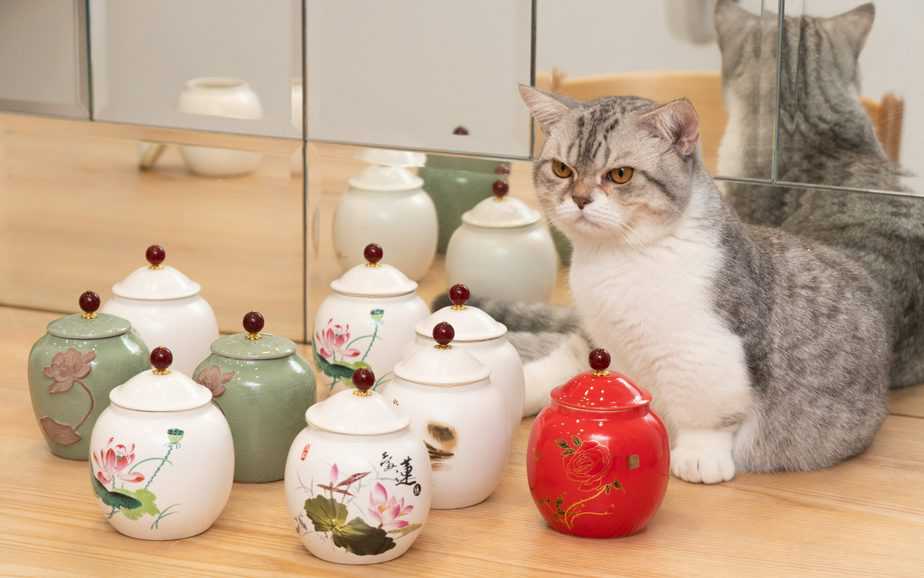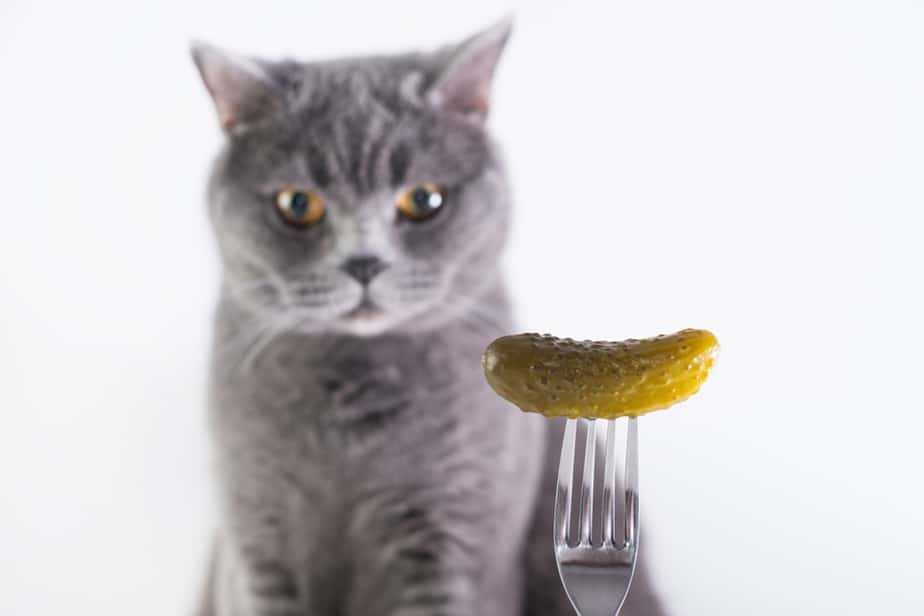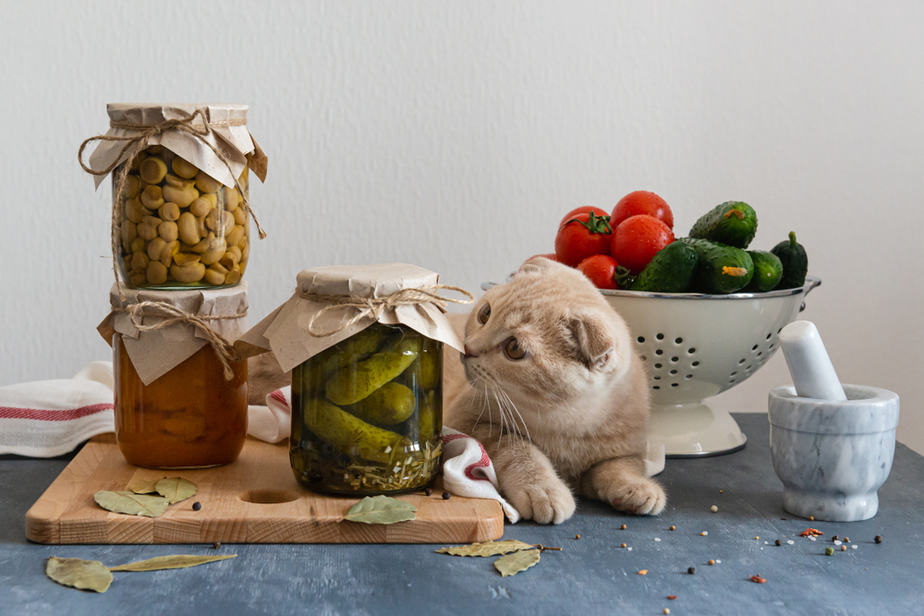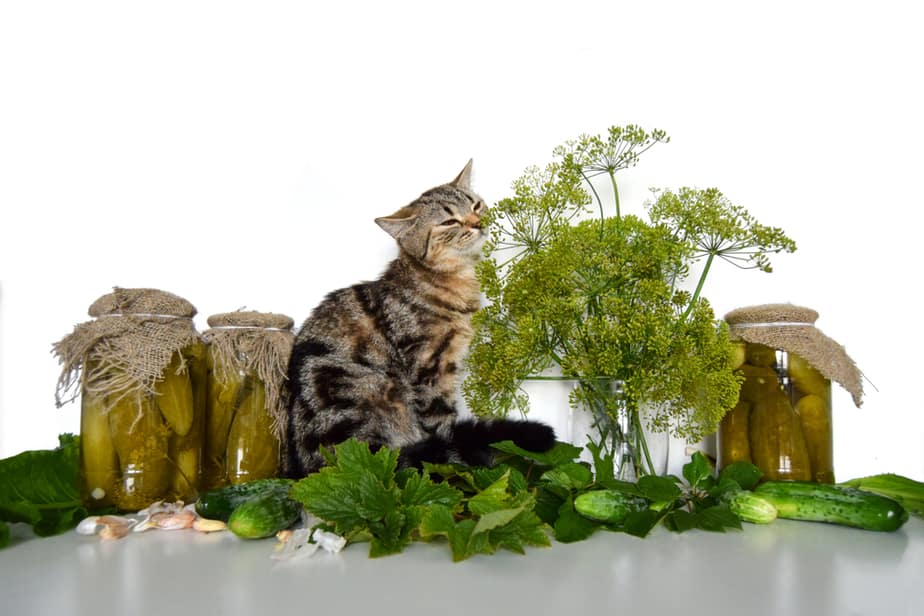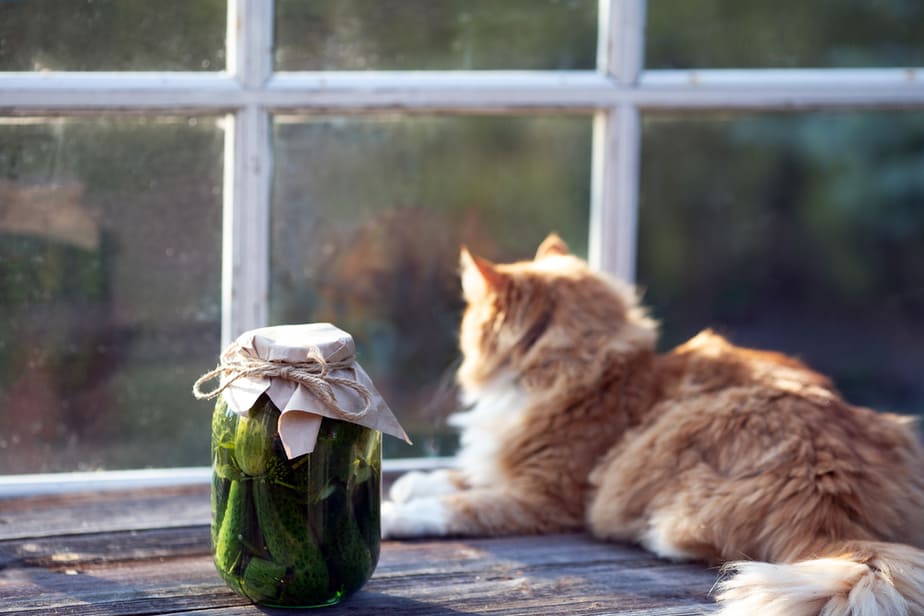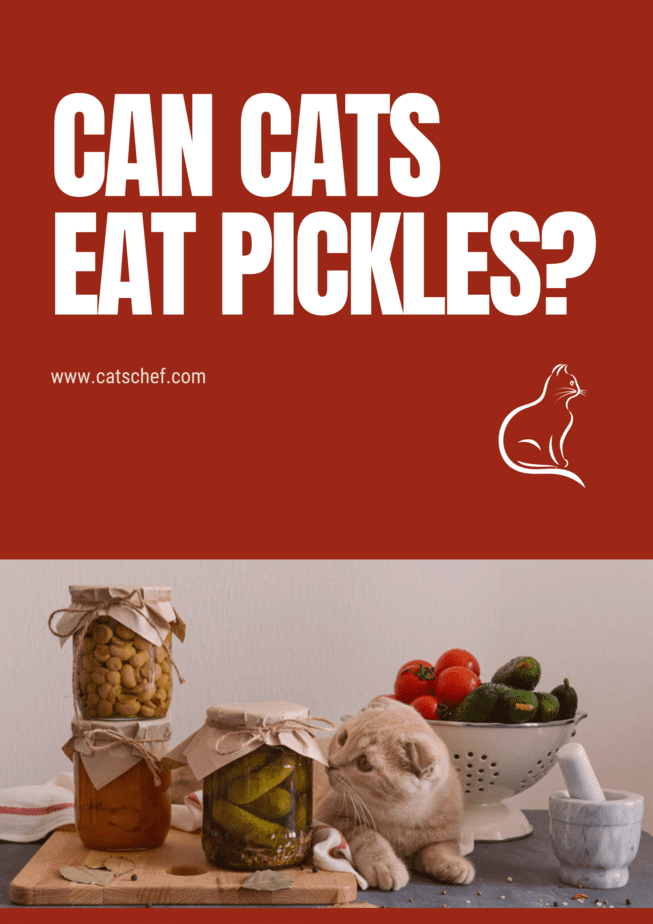📖 Table of Content:
Pickles are truly a slice of heaven for crunch-obsessed humans like myself. The salt. The vinegar. The garlic. They have it all. If you’re anything like me, you’ve probably considered sharing the last jar of pickles with your favorite ball of fur. But can cats eat pickles?
I mean, it doesn’t help that your cat stares at you longingly every time you take a bite of any food. ‘You just ate a bowl of kibble!’ you say, gasping for air, trying to finish your pickle before she comes near.
‘What’s that? A pickle? Sounds delicious!’ she meows back at you, jumping over the furniture and landing into your lap. How can you resist her adorable pouty snout? She spoke her mind loud and clear – she wants that pickle!
Are pickles safe for cats? Humans eat them all the time – not only that, pickled veggies are considered healthy because of their anti-inflammatory properties.
Cats are very different from humans and you’re not really sure if you should give in to the pressure. Let’s just say that you seem to be in a pickle!
Can cats eat pickles?
Pickles are pickled cucumbers. Cucumbers are a healthy vegetable safe for feline consumption. They consist of 95% water which makes them a great ally in keeping your cat healthy and hydrated. It’s so easy to think of pickles as another hearty snack, but unfortunately, they’re not.
Cats are carnivores, which means they get all their nutrients from animals. They naturally require a lot of protein and fat in their regular diet, and you can provide them with essential vitamins by throwing in some delicious, cat-friendly treats.
However, cats can’t eat pickles! Pickles usually contain ingredients that are harmful to your cat, and if eaten in excessive amounts, can lead to serious health issues.
Most of the time cats don’t even like veggies so you shouldn’t be too disappointed that you can’t share that last jar of gherkins with your trusty sidekick.
Why are pickles bad for cats?
Pickles are usually made with cucumbers, vinegar, salt, garlic, and herbs. We already know that cucumbers aren’t bad for cats. They’re rich in vitamins, and they hold a lot of water so they’re a great choice if you want to ensure your furry friend stays hydrated.
Even though your cat won’t drink vinegar, it’s still important to mention that vinegar isn’t toxic to cats. Your curious little monster can lick it as much as she wants, and you can use vinegar to clean around your apartment without any fear.
So, what makes pickles so bad for your cat? Salt, garlic, and some herbs should never be included in your cat’s diet. Keep reading to find out how these ingredients reflect negatively on your cat’s digestive system.
1. Salt
Salt isn’t toxic to cats. However, too much salt can cause various health problems.
Humans can process sodium fairly easily, but you have to keep in mind that your cat is a small creature. What seems like a tiny amount of salt to you might be too much for your furry friend.
In fact, cats shouldn’t eat more than 42 milligrams of salt a day. And do you know how much salt is in one pickle? – 324 milligrams. That’s almost eight times the amount your cat should be consuming on a regular basis!
It’s safe to say you should never let your cat get anywhere near your pickle jar. It would be a high-risk situation considering the fact that too much salt in felines might lead to sodium poisoning. Symptoms include an upset stomach, insatiable thirst, diarrhea, and vomiting.
If your cat sneakily ate a pickle or two, make sure to contact your vet immediately. Some cats might have a higher sodium tolerance, but it’s better to be safe than sorry.
Make sure to keep an eye out for symptoms of poisoning, and follow your vet’s advice closely. Your cat should feel better in no time!
2. Onion and garlic
There are many different brands of pickles to choose from, and you might want to check the ingredients list to make sure your jar doesn’t contain any traces of onion or garlic. It’s a well-known fact that these two ingredients are incredibly toxic to cats.
Onion and garlic consumption can lead to serious health issues in felines. If your cat managed to get its paws on any of them, contact the vet immediately. She might exhibit signs of weakness and discomfort, vomiting and diarrhea, and in some serious cases hemolytic anemia and hemorrhage.
It’s important to mention that the amount of onion and garlic in most pickles is minor. It shouldn’t cause any serious harm to your cat if she doesn’t eat too much. However, it’s better to stay on the safe side and avoid pickles altogether.
3. Herbs
Not all herbs are toxic to cats. Basil, cilantro, rosemary, and thyme are considered safe for our feline friends, and they make a great addition to your pickle recipe.
If you’re getting your pickles from a supermarket make sure to check the ingredient list for oregano, mint, or lemongrass. These herbs are harmful to cats and can lead to serious digestive issues. They can cause an upset stomach, diarrhea, and vomiting.
At the risk of repeating myself, the amount of herbs found in pickles is minor. You shouldn’t be too worried if your cat takes a bite of a mint-flavored pickle. Honestly, you should be more concerned about other harmful ingredients that the pickle might have contained.
Can cats eat dill pickles?
Dill is one of those herbs that are completely safe for cats. Not only that, if you feed your cat some dill you will provide her with certain nutritional and health benefits.
It’s a great source of calcium, iron, magnesium, and vitamin B-6. Overall, it’s a great friend to your cat’s digestive system.
However, never feed your cat dill pickles (or take the dill out of the pickle jar). Everything we’ve learned about different risks regarding the cat-pickle relationship applies to dill pickles, too. They are just like regular pickles – apart from being seasoned with dill.
So, cats can’t eat dill pickles. Pickled veggies overall are simply too salty, and they can contain ingredients toxic to your feline friend. Unfortunately, dill doesn’t mask all the harm pickled tomatoes, cabbage or beetroot can cause to your cat.
If your curious sidekick is really adamant about stealing your food, next time you decide to enjoy pickles make sure to also prepare some additional dill-seasoned cucumbers.
Can cats eat homemade pickles?
Cats can technically eat homemade pickles. If you make them yourself, you can control the amount of salt and you can omit onions, garlic, or any other harmful seasonings. All other ingredients are perfectly safe.
Cucumbers are packed with vitamins, and they are a great addition to your cat’s diet if you’re trying to improve her water intake (since they’re 95% water). You can’t make pickles without vinegar, and luckily for you, this delicious juice is safe for your feline friend.
You can also add some dill, basil, or thyme to give your pickle juice more flavor. These mouth-watering herbs will provide your feline friend with additional nutritional and health benefits. Paw-licking delicious!
It’s important to mention that you don’t have to make homemade pickles for your cat! Unless your furry friend is a big fan of pickles, there’s no reason why you should put so much effort into making something that isn’t necessary for your cat’s regular diet. Now, if you could make pickled meat…
What to do if your cat accidentally eats a pickle?
There’s nothing to worry about if your mischievous companion managed to get its paws onto a pickle or two that you made in your kitchen. But, what if your cat eats a salty, garlicky gherkin straight from the jar you just got at the farmers market?
Don’t panic – but do run and check the ingredients list on the back of the jar. If the pickles contain any amount of onion or garlic make sure to contact your vet immediately. Your cat might not have a sensitive stomach, but you can never be sure with such toxic ingredients.
If your cat is showing any signs of discomfort, an upset stomach, vomiting, diarrhea, or weakness, you might not have enough time to wait for your vet. If you can, take your cat to the emergency animal hospital and explain what happened in detail. They should be able to help her on the spot.
Lastly, try to avoid such situations at all costs. You don’t have to stop eating pickles just because they might harm your cat, but you definitely want to keep them in a safe spot. The same goes for any other foods that might be toxic to your pet.
You can never be too careful when it comes to safety.
Final verdict on pickles – a big “dill” or not?
So, can cats eat pickles? Unfortunately, you should keep this crunchy deliciousness away from your feline.
As much as you enjoy eating these tasty veggies, you shouldn’t feed them to your cat. Pickles are too high in sodium, and they might contain harmful ingredients like onion and garlic.
If you’re willing to spend some time in the kitchen, you can always make some homemade pickles for your feline friend to enjoy. You can control the amount of salt you put in them (if any), and you can swap onion and garlic with some flavorful herbs like basil and dill.
You can even entertain your cat’s curiosity with some simple cucumber bites seasoned with chopped dill. Cats aren’t usually drawn to vegetables, but your furry monster might be an exception. Next time you open a jar of pickles, be prepared to fight off any unwanted paws from that mouth-watering brine!
Read more: Can Cats Eat Green Beans? Do Cats Like These Greens?
